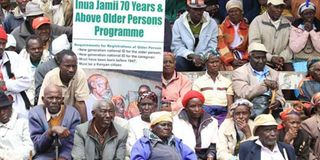Address the plight of senior citizens

Elderly people follow during the launch of Inua Jamii cash transfer programme in Nyeri in 2017. It is rare to find social programmes targeting the senior citizens despite the Constitution mandating the government to integrate them fully in society. FILE PHOTO | NATION MEDIA GROUP
What you need to know:
Constitution, under Article 57 in the Bill of Rights, mandating the government to integrate them fully in society as well as ensure their protection.
In 2007, the government piloted a cash transfer programme targeting the vulnerable in society, among them the elderly.
Development partners should also review their engagements and also roll out more programmes for the elderly.
Development pundits often wonder why, with the youth forming the bulk of the population, African countries still lag behind in development, yet often with high levels of unemployment among this demographic.
This has made governments, the private sector and development partners roll out several programmes targeting young people with the hope of tapping into the youth bulge.
Unfortunately, another all-important group is nearly forgotten in the rush to deal with the panic of impatient youths: The elderly. It is rare to find social programmes targeting the senior citizens despite the Constitution, under Article 57 in the Bill of Rights, mandating the government to integrate them fully in society as well as ensure their protection.
Conversations about the old and their challenges are intermittent and hushed.
CASH TRANSFER
In 2007, the government piloted a cash transfer programme targeting the vulnerable in society, among them the elderly.
The number of beneficiaries of the programme, now known as Inua Jamii, has risen to more than 300,000, according to the ‘2016 Kenya Economic Survey’ report by the Kenya National Statistics Bureau (KNBS). The Labour ministry projects a figure of more than 516,000 this year.
Allocation, through the ministry, has been increased with the 2017/18 Budget figures to Sh7.4 billion.
As one of its key campaign pledges, the Jubilee administration promised to continue this safety net initiative and even throw in free National Hospital Insurance Fund (NHIF) medical cover in January. That is yet to happen though, three months later.
FRAUD
When the Narc government came to power in 2002, it created the Retirement Benefits Authority (RBA) as a way of dealing with endless fraud by pension administrators in the 1990s and offer policy direction and regulation.
But the cash transfer programme aside, nothing has been done to protect the elderly. They are almost pushed to the periphery, forgotten and often left to fend for themselves.
With their children more preoccupied with their own personal needs, the government and charity organisations are left to decide on when, and how, to target the elderly.
The National Social Security Fund (NSSF), which administers pensions, has been dogged with malpractices, denying pensioners their only source of direct income. Some are forced to make endless trips to NSSF offices to follow up on late disbursements.
The Cabinet Secretary for Labour, Mr Ukur Yattani, has, however, promised to put the house in order.
Nonetheless, charity and faith-based organisations have come in to fill the gap.
FINANCIAL SUPPORT
In a remote part of North Imenti in Meru County, Giaki Senior Citizens Group brings together the elderly from Giaki and neighbouring villages.
The group was founded in 2016 by a well-wisher, Mrs Catherine Ajara, after she witnessed the difficulties old people faced in accessing healthcare and financial support. Most of them were unaware of the government programme and those that had registered complained about the unfriendly procedures.
Membership increased from 63 to nearly 700. Members now easily register for the cash transfer programme, receive health education — more so on dieting and lifestyle — medical check-ups and home visits, as well as enjoy the company of peers.
NEW THINKING
Such success stories could offer society a new thinking around caring for the elderly. The government could offer incentives for such grassroots assembling of senior citizens for easier data collection and provision of services. Chiefs could be brought on board to monitor and protect these vulnerable citizens and offer leadership.
Notably, cases of violence targeting the elderly in counties such as Kilifi and Kisii are commonplace. In most of these cases, inheritance of land and other properties is usually the underlying issue, with family members accusing their ageing parents of short-changing them.
The private sector could also plug the gap by reviewing their corporate social responsibility commitments and roll out programmes for the elderly. Also, insurance providers could relax their strict rules on cover for the elderly.
HELPFUL
Development partners should also review their engagements and also roll out more programmes for the elderly. And, considering that most development partners come from the global North, where they have large populations of senior citizens, their expertise could be more helpful.
In the next decade, the number of old people will have nearly doubled; planning for them should have began on Monday.
Mr Nkuubi is the executive director, Governance Pillar Organization. [email protected]; Mr Muruaru is a budding researcher on public policy. [email protected]




